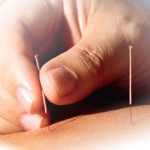BBC News 30 March, 2005

Acupuncture combined with electronic stimulation can lower high blood pressure, US researchers say.
In tests on rats, the treatment lowered raised blood pressure by as much as 50%, the University of California team at Irvine found.
They are now testing to see whether the technique will have the same effect in people with high blood pressure, also known as hypertension.
Their early findings in animals appear in the Journal of Applied Physiology.
Acupuncture can be an excellent complement to other medical treatments, especially for those treating the cardiac system
Dr John Longhurst,
Lead researcher
Acupuncture is an ancient Chinese practice that involves inserting needles at specific points on the body to help treat diseases and symptoms such as pain.
Dr John Longhurst and his team applied the acupuncture to specific points on the forelimbs of rats with artificially elevated blood pressure.
The equivalent sites on humans are on the inside of the forearm, slightly above the wrist.
When the acupuncture was applied on its own, it had no effect on blood pressure.
However, when small, low frequency electrical currents were passed through the needles, the blood pressure went down by between 40 and 50%.
A 30-minute session reduced blood pressure in the test rats by 25mmHg, with the effect lasting for almost two hours.
Fruit and vegetables
Dr Longhurst said: “This suggests that acupuncture can be an excellent complement to other medical treatments, especially for those treating the cardiac system.”
But he added: “This type of electro acupuncture is only effective on elevated blood pressure levels, such as those present in hypertension, and the treatment has no impact on standing blood pressure rates.”
He said that acupuncture triggered the release of chemicals in the brain that in turn dampened the response of the cardiovascular system.
This decreased the heart’s activity and its need for oxygen, which in turn could lower blood pressure, and promoted healing for a number of heart conditions including heart attacks and hypertension.
Belinda Linden, of the British Heart Foundation, said the research would need to be supported by controlled clinical trials before being applied as an accepted form of blood pressure control for humans.
“So our message remains the same – high blood pressure is best controlled by keeping your weight down, eating plenty of fruit and vegetables, cutting your salt intake, increasing physical activity and if needed, taking appropriate medications.”
Dr Mike Cummings, medical director of the British Medical Acupuncture Society, said the study was interesting, but he would not recommend patients sought acupuncture treatment for high blood pressure “at this stage”.

 August 22, 2010 in
August 22, 2010 in 




